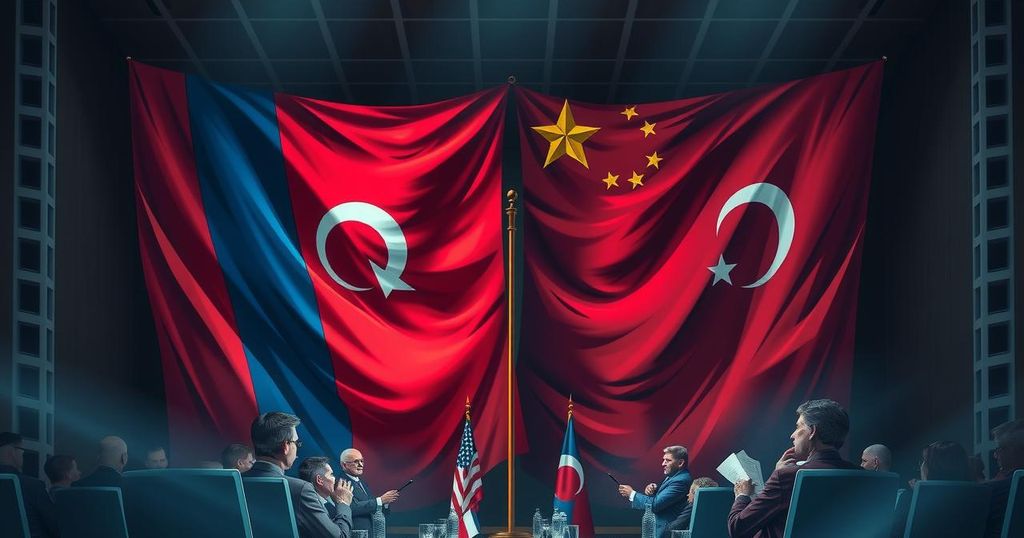Recent discussions indicated that Russian President Vladimir Putin is set to mediate a nuclear agreement between the United States and Iran, following a request from President Trump. However, experts caution against trusting Russia, noting its conflicting interests with the U.S. in the Middle East. The article urges the U.S. to engage E3 allies instead, promoting a united front in negotiations with Iran to deter nuclear proliferation.
In recent developments, Russian President Vladimir Putin agreed to mediate a nuclear agreement between the United States and Iran, following a request from U.S. President Donald Trump during a phone call in February. U.S. Secretary of State Marco Rubio later communicated this to Russian Foreign Minister Sergey Lavrov during a meeting in Saudi Arabia. Trump’s clear intention for a new deal with Iran was reiterated through an executive order reinstating the maximum pressure campaign and a letter addressed to Iran’s Supreme Leader, Ayatollah Ali Khamenei.
However, the White House should reconsider this strategy, as Russia’s vested interests in Iran make it an inappropriate mediator. Moscow’s alignment with Tehran is likely to undermine U.S. interests in the Middle East and threaten the security of allies such as Israel and Gulf nations. Trusting Russia to serve as a mediator echoes the foolishness of believing a predator could negotiate peace between hunters and their prey.
Trump’s approach to international relations has evolved significantly, particularly in regard to Ukraine. Unlike former President Biden, who emphasized collaboration with NATO allies to counter Russian aggression, Trump has criticized Ukraine and its European partners. This divergence raises concerns about allowing Moscow a role in negotiating Iran’s nuclear issues as their interests diverge starkly from those of the United States.
Historically, Russia has consistently undermined U.S. interests in the region by supporting adversaries like Assad’s regime in Syria. Russia has proven its capacity to intimidate and destabilize the region through military support to groups such as Hezbollah and the Houthis in Yemen, directly affecting Israel’s security and enabling attacks on global shipping.
Moreover, Russia has collaborated with Iran on advancements in ballistic missile technology, enabling attacks against Israeli targets. In defiance of U.S. sanctions, trade and investment relations between Iran and Russia have deepened, further complicating U.S. efforts to impose pressure. A recent cooperation treaty between the two countries signifies an inextricable relationship, making Russia’s involvement in negotiations highly questionable.
Although some analysts suggest that Russia might possess leverage over Iran that could facilitate a constructive nuclear agreement, historical evidence suggests otherwise. More likely, Russia will exploit its role to assert leverage over U.S. interests, further entrenching Iran’s position as a regional power, and hindering U.S. objectives.
Given the critical importance of preventing an Iranian nuclear weapon, the United States ought not to rely on an adversary like Russia, known for working counter to American interests. Instead, Trump should gather the E3 nations—United Kingdom, France, and Germany—to form a unified stance against Iran and strengthen the maximum pressure campaign.
Engaging the E3 could lead to a coordinated, multilateral approach that enhances leverage in negotiations with Iran. The collective influence of these nations, particularly following shifts in their policy since 2018, presents an opportunity for a robust strategy aimed at eliminating the Iranian nuclear threat while fulfilling Trump’s pledge of achieving peace through strength.
The recent proposal for Russia to mediate a nuclear agreement between the United States and Iran raises significant concerns. Given Russia’s historical alignment with Iranian interests and its destructive actions in the Middle East, relying on Moscow for such critical negotiations is imprudent. The United States, therefore, should prioritize collaboration with the E3 nations to fortify a multilateral approach that effectively counters the Iranian nuclear threat and aligns with the objectives of American allies in the region.
Original Source: foreignpolicy.com




